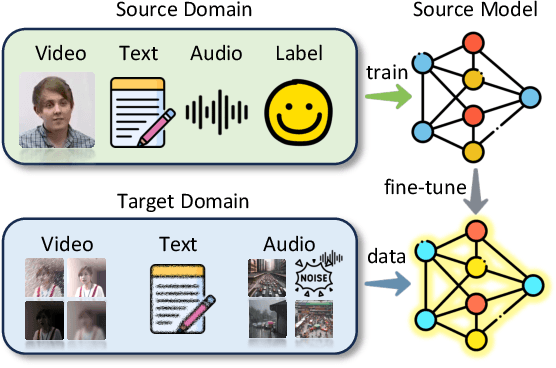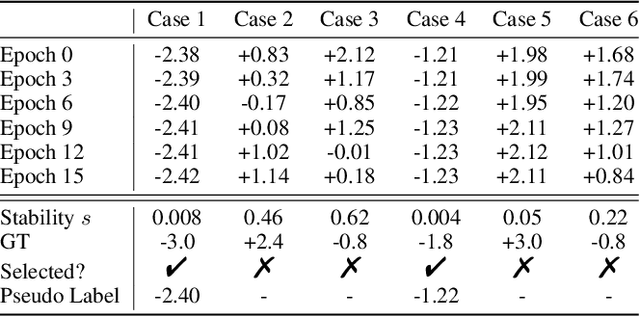Wenlong Xu
Bridging the Gap for Test-Time Multimodal Sentiment Analysis
Dec 10, 2024



Abstract:Multimodal sentiment analysis (MSA) is an emerging research topic that aims to understand and recognize human sentiment or emotions through multiple modalities. However, in real-world dynamic scenarios, the distribution of target data is always changing and different from the source data used to train the model, which leads to performance degradation. Common adaptation methods usually need source data, which could pose privacy issues or storage overheads. Therefore, test-time adaptation (TTA) methods are introduced to improve the performance of the model at inference time. Existing TTA methods are always based on probabilistic models and unimodal learning, and thus can not be applied to MSA which is often considered as a multimodal regression task. In this paper, we propose two strategies: Contrastive Adaptation and Stable Pseudo-label generation (CASP) for test-time adaptation for multimodal sentiment analysis. The two strategies deal with the distribution shifts for MSA by enforcing consistency and minimizing empirical risk, respectively. Extensive experiments show that CASP brings significant and consistent improvements to the performance of the model across various distribution shift settings and with different backbones, demonstrating its effectiveness and versatility. Our codes are available at https://github.com/zrguo/CASP.
PACE: A Pragmatic Agent for Enhancing Communication Efficiency Using Large Language Models
Jan 30, 2024Abstract:Current communication technologies face limitations in terms of theoretical capacity, spectrum availability, and power resources. Pragmatic communication, leveraging terminal intelligence for selective data transmission, offers resource conservation. Existing research lacks universal intention resolution tools, limiting applicability to specific tasks. This paper proposes an image pragmatic communication framework based on a Pragmatic Agent for Communication Efficiency (PACE) using Large Language Models (LLM). In this framework, PACE sequentially performs semantic perception, intention resolution, and intention-oriented coding. To ensure the effective utilization of LLM in communication, a knowledge base is designed to supplement the necessary knowledge, dedicated prompts are introduced to facilitate understanding of pragmatic communication scenarios and task requirements, and a chain of thought is designed to assist in making reasonable trade-offs between transmission efficiency and cost. For experimental validation, this paper constructs an image pragmatic communication dataset along with corresponding evaluation standards. Simulation results indicate that the proposed method outperforms traditional and non-LLM-based pragmatic communication in terms of transmission efficiency.
 Add to Chrome
Add to Chrome Add to Firefox
Add to Firefox Add to Edge
Add to Edge